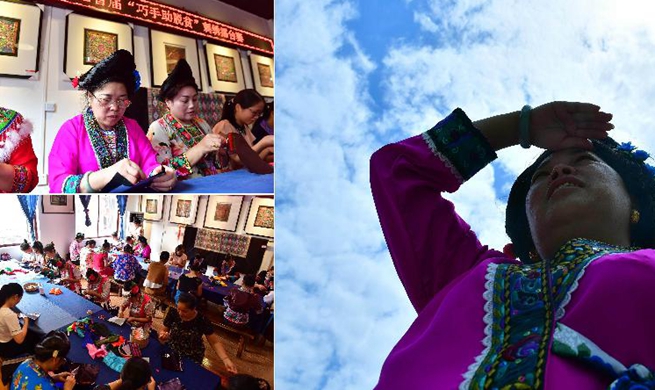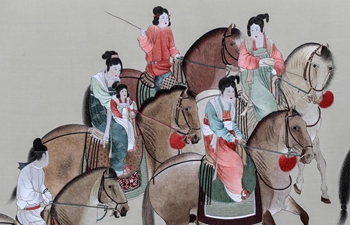by Keren Setton
JERUSALEM, July 31 (Xinhua) -- Moshe Fischer was born in Israel with visual impairment 68 years ago. Doctors told his parents that he suffered from oculocutaneous albinism, and there was no cure.
No optical solution or surgery would fix his problem. The best he could hope for was relying on visual aids, such as magnifying glasses.
"I got report cards (from school) saying I wasn't motivated ... not paying attention," Fischer told Xinhua, "Somehow I plotted my way through high school and university."
All that changed in 2013 when Fischer was exposed to a new technology from a budding Jerusalem high-tech company Orcam.
He first tested their device and when it was ready, he became an avid user. Orcam MyEye, a USB flash drive size device, is mounted on an eyeglass arm and helps him see and do things he could not do for decades.
Behind the small gadget are years of work to create a sophisticated algorithm.
Whoever uses the device can simply point to an object and it will tell them what is in front of them.
The device is currently being used by many users around the world and is available in almost 20 languages.
It is a wearable technology that uses Artificial Intelligence.
On one side, it has a camera and on the other, a speaker. With a simple finger stroke, it can scan a page on a book and read it to the user. It does the same for money notes, grocery products and bus signs.
It also tells time after being directed with an instinctive hand movement of moving one's wrist.
Up to 100 names of people can be saved to the device. The user takes a picture of the person in front of him, records their name and every time that person appears in front of them, the device will announce it.
For people like Fischer, the device is life changing. He can now do things and have experiences he either avoided or simply did not have before.
"I started devouring books ... using a smartphone. It's amazing," he said excitedly, "For me, it just enables me to do many things that I used to avoid doing."
He started going to museums and also to window shop. The device can recognize colors, helping him to decide what clothes to wear.
The unit works offline, without using any cloud services. It helps the user in real time, with virtually no delay.
According to Ziv Aviram, one of the co-founders of Orcam, they have no serious competitors at the moment. There are many apps available that will scan text and use cloud services that then return it to the user with a significant delay. But Aviram believes real competition is "just a matter of time."
And for that reason, they are working hard on further enhancing their technology.
"We are working now on something interactive, that you can talk to the device. For example, you will ask -- what is the total? The total is 200 U.S. dollars, please pay it -- the transaction is done," Aviram told Xinhua.
Moshe Fischer is hoping for a GPS feature that will pinpoint major landmarks around him and will tell him where he is.
Aviram and Amnon Shashua, who founded Orcam together, are also the founders of Mobileye, a world leader in autonomous driving software. Mobileye was acquired last year by processing giant Intel, in the biggest acquisition in Israeli history.
The Jerusalem-based Orcam is now planning its entrance to the Chinese market.
Rotem Geslevich, Director of Business Development at the firm, has recently returned from China.
"It's a huge market," she told Xinhua, "they (Chinese) are very into new technology, very open to technology, there is a demand from different channels."
While the product does not make blind people see, it has the potential of greatly improving the lives of those with severe impairments by helping them gain increased independence and even change their social interactions.
It is this motivation that keeps the company going.
"To see the customer that exposed to the system and usually the first reaction is that they start to cry -- it's so moving," said Aviram.
"This is the kind of motivation that all of us, all the employees in the company, have to continue and to struggle with the challenges to build systems on a human level."

















